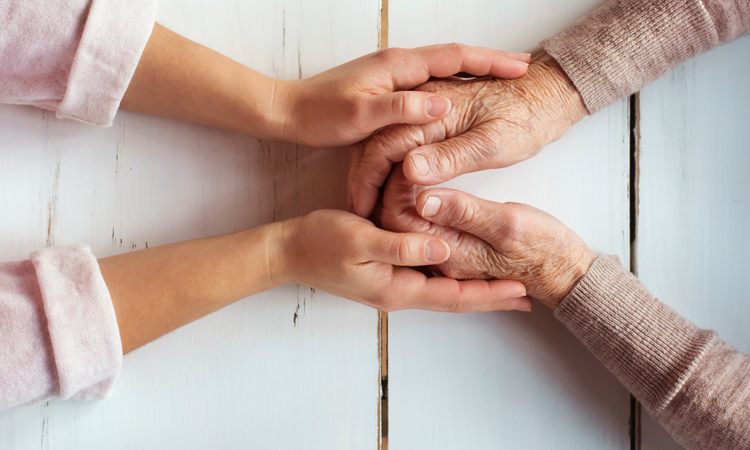My son Robert and I were talking on the phone shortly after his wife had brain surgery. In a moment of physical and emotional exhaustion, he exclaimed, “The life of a caregiver is no life at all!”
I said, “You’re right, Rob. It’s very difficult.”
He went on to say that he was having to do all of the work he’d always done at home and all of Erica’s chores. He had to go to work, and when he got home, he had to fix dinner, take care of the yard and the dogs, do the laundry, and take care of Erica. He was exhausted when he fell into bed at night, but he was so worried about her, that he had difficulty sleeping.
Adapting to the Life of a Caregiver
Rob briefly experienced the physical and emotional stress that nearly 44 million people in the United States deal with every day, as they care for loved ones who are aging, chronically ill, disabled, or living with progressive and degenerative diseases such as Alzheimer’s and Parkinson’s.
In a short-term crisis, it’ is natural and often necessary to give every ounce of energy you have to helping your loved one. But when caregiving stops being a temporary interruption in your normal life and turns into a long-term obligation, you will need to develop some different strategies in order to avoid caregiver burnout.
Understanding the Changes in Your Relationship
When people are in pain or are experiencing ongoing cognitive and physical decline, their focus turns inward. They often can only think about their own immediate need. The mutual give-and-take relationship you may have enjoyed in the past can quickly turn into a one-way streets where you do all the giving, and your care receiver does all the taking.
My husband has suffered with chronic and debilitating back pain for over ten years. At its worst, his pain became like a third person in our relationship. It was a warden who limited our freedom and controlled everything we did, down to whether we could sleep at night, join friends for dinner and a movie, or even go for a walk around the block. For several months, before and after his second major back surgery, as his world got smaller, mine did as well.
Developing an Attitude of Creative Indifference Toward Caregiving
I learned from my mother the importance of setting aside a little time each day to do something for myself. She cared for my dad for six-and-a-half years after he suffered a debilitating stroke. She managed her emotional stress by writing letters to me in which she described in detail her anger, guilt, depression, and grief. Writing gave her a safe outlet for emotional stress. For pleasure, at night after she got Dad into bed, she would sit up and read.
Perhaps most importantly, she developed what she called an “attitude of creative indifference,” which allowed her to care for my dad without becoming emotionally devastated by events or the progression of his disease. To learn how to develop an attitude of creative indifference, please click on this link to my website: Caregiver Support for Creative Indifference
Like my mother, I found writing to be cathartic. Instead of letters, I started writing blogs and articles for other caregivers. I also developed CaregiverHelp.com, an online caregiver support website, which provided a creative outlet for me without having to leave the house. I also set aside an hour each morning to walk. Getting out in the fresh air, enjoying the sights, smells, and sounds of nature restored my soul and energized my body.
Self-Care is Not Selfish
If I could only impart one message to other caregivers, it would be this: self-care is not selfish.
There is a limit to how much a person can give. If your care receiver is incapable of giving anything back, it will be imperative for you to find the time to take care of your body and nourish your own soul.
Doing this will not make the job of caregiving easy, but it might lighten your load just enough to give you the physical and emotional energy you need to continue providing the care your loved one so desperately needs.
Happy Endings
My husband and I were having dinner with Rob and Erica about a month after her surgery. We were all feeling incredibly grateful that she’d had such a positive outcome. She told Rob, “I was afraid you might feel like you’d gotten cheated by marrying a woman with a brain tumor.”
He said, “I took our vows seriously. Remember the part about ‘in sickness and health?’” He smiled shyly, and said, “I’m just thankful that the surgeons didn’t fix the part of your brain that makes you love me.”
Caregiving puts a serious strain on any relationship, but if you will commit to taking care of yourself, and if you can cut yourself a little slack on the days that you’re not feeling or acting as loving as you would like to be, you will get through it. And whether it’s a short-term situation or something that stretches out for years, when it’s over, you will realize that you might not have been perfect in every way, but you did the best you could. You will have a sense of accomplishment and pride for helping a loved one who was not capable of caring for themselves. Eventually, you will come to understand that as difficult as it was, through it all, you were growing in beautiful and unexpected ways.
Post Disclaimer
This content is for informational purposes only and does not constitute medical advice. Please consult a healthcare professional for any medical concerns.


